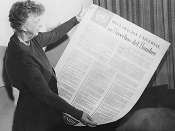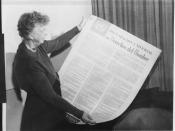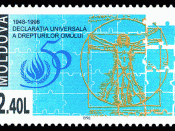Equality With Men
Women have always been the primary influence in the private lives of their families, organizations and communities, but had no public role in early 19th century Canada at all. The right to vote was strictly for men only and women were not recognized in the Constitution as legal 'persons', they had absolutely no political rights whatsoever. And when women were given the right to vote and hold political office, their interests were still not equally represented in politics and were still not socially equal to their husbands or male co-workers. In fact, Nellie McClung, after learning that women could be appointed to the Senate, stated, "now that we are persons, I wonder if we will notice any difference". And from that time on, every time women achieved new economical and political rights, that question resounded in everyone's head repeatedly. However, Canadian women would have to engage in very difficult legal proceedings in the 1920's to gain a personal legal status.
With few exceptions, women had been excluded from most professions other than nursing and teaching until the beginning of the century. Canadian women and children were suffering in the late 1800's and early 1900's when their husbands would come home drunk and penniless after working for weeks in the mines or out in the bush lumbering. Thus, the Woman's Christian Temperance Union (WCTU) was founded and with a far-spreading influence, campaigned for the prohibition of the sale and production of alcohol. Soon however, the leaders of the WCTU began to realize that women would have to gain basic political rights first to effect the reforms they sought.
There were actually, several attempts made from 1866 to 1884 by Sir John A. MacDonald to give women the right to vote, but all eight proposals were defeated every time...


